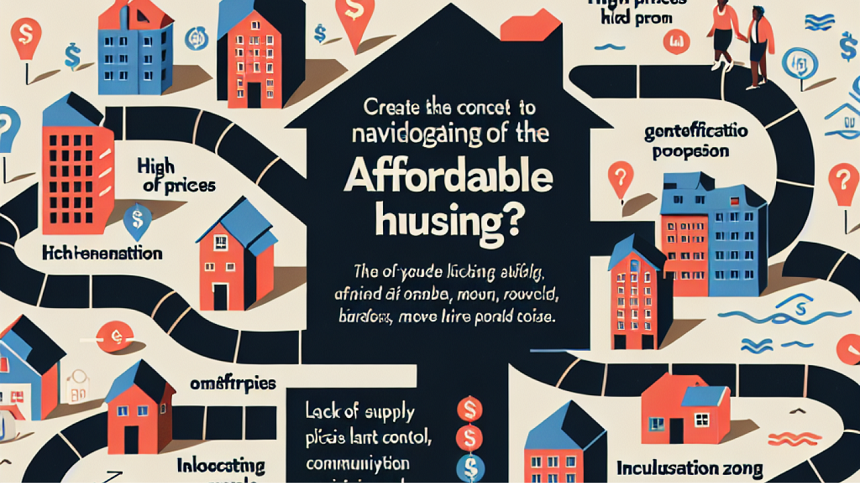The affordable housing crisis is affecting millions of people worldwide, as demand for housing continues to outpace supply and prices soar. While the situation can seem overwhelming, there are practical steps individuals and communities can take to mitigate its impact. This guide aims to provide insights and strategies to help you make informed decisions and find solutions during these challenging times.
Understanding the Affordable Housing Crisis
Before we explore solutions, it’s important to understand the root causes of the affordable housing crisis. Factors such as population growth, limited availability of land, restrictive zoning laws, and increasing construction costs all contribute to the current situation. These challenges have made it difficult for many people, especially low- and middle-income families, to secure affordable housing.
Empowering Yourself as a Renter or Buyer
1. Expand Your Search Parameters
Consider looking in less popular neighborhoods or nearby towns where housing may be more affordable. Often these areas offer their own unique charm and community feel, along with lower price points.
2. Explore Shared Housing Options
Co-housing or shared living arrangements can significantly reduce costs. Explore house-sharing apps and platforms or connect with local community boards to find potential roommates or co-housing opportunities.
3. Leverage Government Assistance Programs
Research federal, state, and local programs designed to assist with housing costs. Subsidies, tax credits, or low-interest loans may be available to those who qualify, helping to lighten the financial burden of housing.
4. Negotiate Rent and Lease Terms
Communicate openly with landlords about your situation and try to negotiate rent or favorable lease terms. Some landlords may be open to adjustments in return for guaranteed long-term tenancy.
5. Financial Planning and Budgeting
Make a detailed budget to understand where your money goes each month. Prioritize saving for housing deposits and look for areas to cut discretionary spending.
Community Involvement and Advocacy
1. Advocate for Policy Changes
Join local advocacy groups working to change zoning laws and promote affordable housing development. Attend town hall meetings and engage with policymakers to push for inclusive housing policies.
2. Support Housing Nonprofits
Many nonprofits focus on increasing affordable housing availability and assisting those in need. Support these organizations through donations, volunteer work, or by participating in their campaigns.
3. Foster Community Support Networks
Build or join community networks that support residents in need of housing assistance. These networks can provide resources, advice, and connections to help people find suitable housing options.
Developers and Investors
1. Invest in Affordable Housing Projects
Consider directing investments towards projects that focus on affordable housing development. These projects not only provide financial returns but also contribute positively to the community.
2. Adopt Sustainable Building Practices
Utilize cost-effective and sustainable building methods to reduce construction costs while delivering high-quality housing. This can make projects more viable and attractive to potential buyers or renters.
3. Engage with Communities
Work closely with community leaders to understand the specific housing needs of different areas. This approach ensures that developments meet the demand and gain local support.
Resources and Tools for Navigating the Crisis
Navigating the affordable housing crisis requires access to reliable resources and tools that offer guidance and assistance. Fortunately, there are numerous avenues for support:
1. Online Platforms and Marketplaces
Utilize online housing platforms and marketplaces to search for available rentals or shared housing opportunities. Websites like Zillow, Apartments.com, and Craigslist can be valuable resources in finding budget-friendly options, while house-sharing apps like Roommates.com and SpareRoom can connect you with potential roommates.
2. Financial Counseling Services
Seek out financial counseling services that specialize in housing assistance. Organizations like the National Foundation for Credit Counseling and local housing authorities can provide expert advice on budgeting, credit repair, and financing options that align with your housing goals.
3. Housing Hotlines and Community Centers
Local community centers and housing hotlines often provide free assistance for those facing housing difficulties. These services can offer immediate support, connect you with local resources, and provide valuable information on your rights as a renter or buyer.
4. Educational Workshops and Seminars
Participate in workshops and seminars hosted by housing nonprofits or community organizations. These events often cover topics like first-time home buying, understanding rental agreements, and navigating government assistance programs, empowering you with knowledge and practical skills.
By leveraging these resources and tools, individuals can better navigate the complexities of the affordable housing landscape, making informed decisions that lead to secure and sustainable living arrangements. As everyone continues to adapt to the evolving housing market, education and community collaboration stand as pillars of support in overcoming the crisis.
Conclusion
While the affordable housing crisis presents significant challenges, proactive measures by individuals, communities, and developers can help ease its impact. By exploring alternative housing options, advocating for policy change, and investing in affordable developments, we can collectively work towards a future where everyone has access to safe and affordable housing. Stay informed, stay engaged, and remember that every small action counts.

